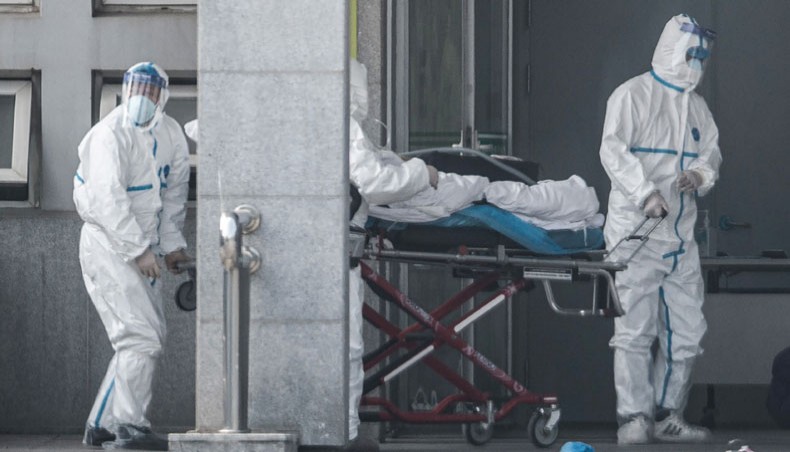Chinese coronavirus kills 80, hundred more infected
The death toll from China’s coronavirus epidemic spiked to 80 with hundreds of new infections on Monday, despite unprecedented quarantines and travel lockdowns, as foreign governments scrambled to help their trapped citizens.
The virulence of a contagion causing fear nationwide has prompted authorities to impose transport curbs around China to cut off transmission routes, and extend a national holiday to delay people travelling back to work.
With many thousands of foreigners trapped in the ground zero city of Wuhan, which is under a virtual lockdown, the United States and France were among several countries formulating plans to evacuate their citizens by plane.
With the coronavirus also expanding globally, World Health Organisation chief Tedros Adhanom Ghebreyesus headed to Beijing to meet with government officials on the crisis.
‘My WHO colleagues and I would like to understand the latest developments and strengthen our partnership with China in providing further protection against the outbreak,’ he said on Twitter.
Related Coverage:
Tedros last week stopped short of declaring the outbreak an international public health emergency, which would have prompted more concerted international action including possible trade or travel restrictions.
Cases have been reported as far afield as France, the US and Canada, with various countries in Asia also detecting cases. Those infected had previously been in China.
The new additions to China’s death toll came entirely from the epicentre province of Hubei, which on Monday reported 24 fresh fatalities.
Most fatalities and overall cases have been in Hubei, and the government says the deaths have largely been elderly or people already weakened by pre-existing health conditions.
But China’s National Health Commission said on Monday that in addition to 2,744 infections confirmed nationwide — an increase of 769 — there were nearly 6,000 suspected cases and more than 30,000 people under medical observation.
Hardest-hit has been Hubei’s capital Wuhan, where the virus is suspected to have come from animals in a market selling a wide range of exotic wild game.
Wuhan has been under virtual lockdown for days, with transport halted and citizens told to stay at home.
At a press briefing in Beijing on Sunday, the head of China’s disease control agency, Gao Fu, said it was ‘not as powerful as SARS,’ but officials warned it could be getting stronger.
Shandong province in the east and four cities — Beijing, Shanghai, Xi’an and Tianjin — have announced bans on long-distance buses entering or leaving, while some provinces and cities made it mandatory to wear face masks in public.
The Wuhan meat market at the epicentre sold a vast range of unusual dinner fare including rats, snakes and hedgehogs.
On Sunday, the government said it was banning all trade in wildlife until the emergency is over, but conservationists called for Beijing to make the ban permanent to reduce the possibility of future outbreaks.
The death toll from China’s coronavirus epidemic spiked to 80 with hundreds of new infections on Monday, despite unprecedented quarantines and travel lockdowns, as foreign governments scrambled to help their trapped citizens.
The virulence of a contagion causing fear nationwide has prompted authorities to impose transport curbs around China to cut off transmission routes, and extend a national holiday to delay people travelling back to work.
With many thousands of foreigners trapped in the ground zero city of Wuhan, which is under a virtual lockdown, the United States and France were among several countries formulating plans to evacuate their citizens by plane.
With the coronavirus also expanding globally, World Health Organisation chief Tedros Adhanom Ghebreyesus headed to Beijing to meet with government officials on the crisis.
‘My WHO colleagues and I would like to understand the latest developments and strengthen our partnership with China in providing further protection against the outbreak,’ he said on Twitter.
Tedros last week stopped short of declaring the outbreak an international public health emergency, which would have prompted more concerted international action including possible trade or travel restrictions.
Cases have been reported as far afield as France, the US and Canada, with various countries in Asia also detecting cases. Those infected had previously been in China.
The new additions to China’s death toll came entirely from the epicentre province of Hubei, which on Monday reported 24 fresh fatalities.
Most fatalities and overall cases have been in Hubei, and the government says the deaths have largely been elderly or people already weakened by pre-existing health conditions.
But China’s National Health Commission said on Monday that in addition to 2,744 infections confirmed nationwide — an increase of 769 — there were nearly 6,000 suspected cases and more than 30,000 people under medical observation.
Hardest-hit has been Hubei’s capital Wuhan, where the virus is suspected to have come from animals in a market selling a wide range of exotic wild game.
Wuhan has been under virtual lockdown for days, with transport halted and citizens told to stay at home.
At a press briefing in Beijing on Sunday, the head of China’s disease control agency, Gao Fu, said it was ‘not as powerful as SARS,’ but officials warned it could be getting stronger.
Shandong province in the east and four cities — Beijing, Shanghai, Xi’an and Tianjin — have announced bans on long-distance buses entering or leaving, while some provinces and cities made it mandatory to wear face masks in public.
The Wuhan meat market at the epicentre sold a vast range of unusual dinner fare including rats, snakes and hedgehogs.
On Sunday, the government said it was banning all trade in wildlife until the emergency is over, but conservationists called for Beijing to make the ban permanent to reduce the possibility of future outbreaks.
News Courtesy: www.newagebd.net











